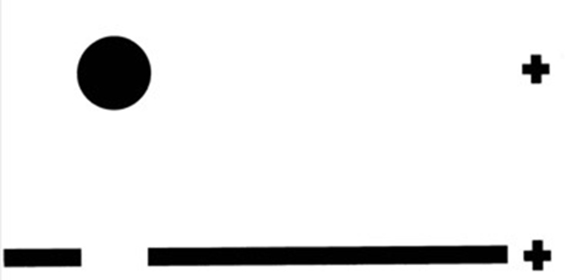Thursday, 11 February 2021
Revisiting an optical illusion in terms of predictive processing
 I recently came across a little experiment that I posted years ago on this website to show how the blind spot in each of your eyes works. The blind spot is a part of the retina where there are no photoreceptors, because it is where the axons of the retina’s ganglion cells converge and exit the eye, forming the optical nerve. As a result, there’s a corresponding area in your field of vision that doesn’t register on the retina. Hence, in theory, you shouldn’t see anything there. But in reality, you don’t see any such blank spot in your field of vision.
I recently came across a little experiment that I posted years ago on this website to show how the blind spot in each of your eyes works. The blind spot is a part of the retina where there are no photoreceptors, because it is where the axons of the retina’s ganglion cells converge and exit the eye, forming the optical nerve. As a result, there’s a corresponding area in your field of vision that doesn’t register on the retina. Hence, in theory, you shouldn’t see anything there. But in reality, you don’t see any such blank spot in your field of vision.
To find out why not, let’s revisit this optical illusion from the standpoint of predictive-processing theory, which has become more and more accepted in cognitive science over the past 10 years or so. (more…)
The Senses | Comments Closed
Thursday, 14 January 2021
Being rich makes you less empathetic (even when it’s just Monopoly money)
 Today I’m going to talk about the work of social psychologist Paul Piff, whose research interests revolve around social hierarchies, economic inequality, altruism and co-operation. I learned about Piff while working on a French-language documentary inspired by the book Capital in the 21st Century, by French economist Thomas Piketty. In this documentary, Piff explains an experiment in which people playing the board game Monopoly showed disturbing changes in behaviour when they won repeatedly because the researchers had rigged the rules in their favour (more money to begin with, more dice to roll to pass Go more often, etc.)—in other words, had given them more power. I have touched on this same subject in an earlier blog post, about Dacher Keltner’s research on how wealth alienates the wealthy from their humanity. And it turns out to be no accident that these two authors’ findings are so consistent: as I just discovered this morning, they have published many articles together! (more…)
Today I’m going to talk about the work of social psychologist Paul Piff, whose research interests revolve around social hierarchies, economic inequality, altruism and co-operation. I learned about Piff while working on a French-language documentary inspired by the book Capital in the 21st Century, by French economist Thomas Piketty. In this documentary, Piff explains an experiment in which people playing the board game Monopoly showed disturbing changes in behaviour when they won repeatedly because the researchers had rigged the rules in their favour (more money to begin with, more dice to roll to pass Go more often, etc.)—in other words, had given them more power. I have touched on this same subject in an earlier blog post, about Dacher Keltner’s research on how wealth alienates the wealthy from their humanity. And it turns out to be no accident that these two authors’ findings are so consistent: as I just discovered this morning, they have published many articles together! (more…)
Emotions and the Brain | Comments Closed







